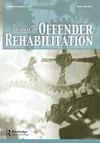Therapeutic alliance and its setting with those who have sexually offended and implications for community maintenance programs
IF 1.1
Q3 SOCIAL WORK
引用次数: 0
Abstract
Abstract Developing an understanding of how people who have been to prison maintain changes they may have made in a custodial program, successfully (re)integrate upon release to the community and ultimately, desist, is imperative if we want to prevent their return to prison. Reentry and reintegration processes are fraught with challenges for parolees and community support to assist with this process is important. Community maintenance programs are programs that are in theory designed to aid those who have been released from prison to successfully reintegrate, by providing ongoing specialized and professional support in the community. Factors relevant to successful reintegration for those who have offended included a variety of factors beyond program content, which includes therapist characteristics, client’s perceptions of their therapists and the therapeutic alliance. This paper examines the therapeutic relationship and proposes that the setting within which a therapeutic relationship takes place needs to be considered as a fourth factor to Bordin’s model of therapeutic alliance, which seems particularly relevant to the forensic context. There will be a specific focus on the impact of correctional organizations on therapeutic programs and staff. Implications for practice and future research are also considered.治疗联盟及其与性侵犯者的关系以及对社区维护计划的影响
如果我们想要防止他们重返监狱,就必须了解那些曾经入狱的人是如何保持他们在监禁项目中可能做出的改变,在释放后成功地(重新)融入社区,并最终放弃的。对假释犯来说,重返社会和重新融入社会的过程充满了挑战,社区支持协助这一过程非常重要。社区维护项目是理论上旨在帮助那些从监狱释放的人成功重新融入社会的项目,通过在社区中提供持续的专业和专业支持。对那些冒犯者来说,成功重新融入社会的相关因素包括项目内容之外的各种因素,包括治疗师的特征、来访者对治疗师的看法和治疗联盟。本文考察了治疗关系,并提出治疗关系发生的环境需要被视为Bordin治疗联盟模型的第四个因素,这似乎与法医背景特别相关。将特别关注惩教机构对治疗方案和工作人员的影响。对实践和未来研究的启示也被考虑。
本文章由计算机程序翻译,如有差异,请以英文原文为准。
求助全文
约1分钟内获得全文
求助全文
来源期刊

Journal of Offender Rehabilitation
SOCIAL WORK-
CiteScore
1.60
自引率
0.00%
发文量
24
期刊介绍:
The Journal of Offender Rehabilitation is a multidisciplinary journal of innovation in research, services and programs in criminal justice and corrections. The journal is an essential professional resource for practitioners, educators and researchers who work with individuals involved in the criminal justice system and study the dynamics of rehabilitation and individual and system change. Original research using qualitative or quantitative methodology, theoretical discussions, evaluations of program outcomes, and state of the science reviews will be considered.
 求助内容:
求助内容: 应助结果提醒方式:
应助结果提醒方式:


